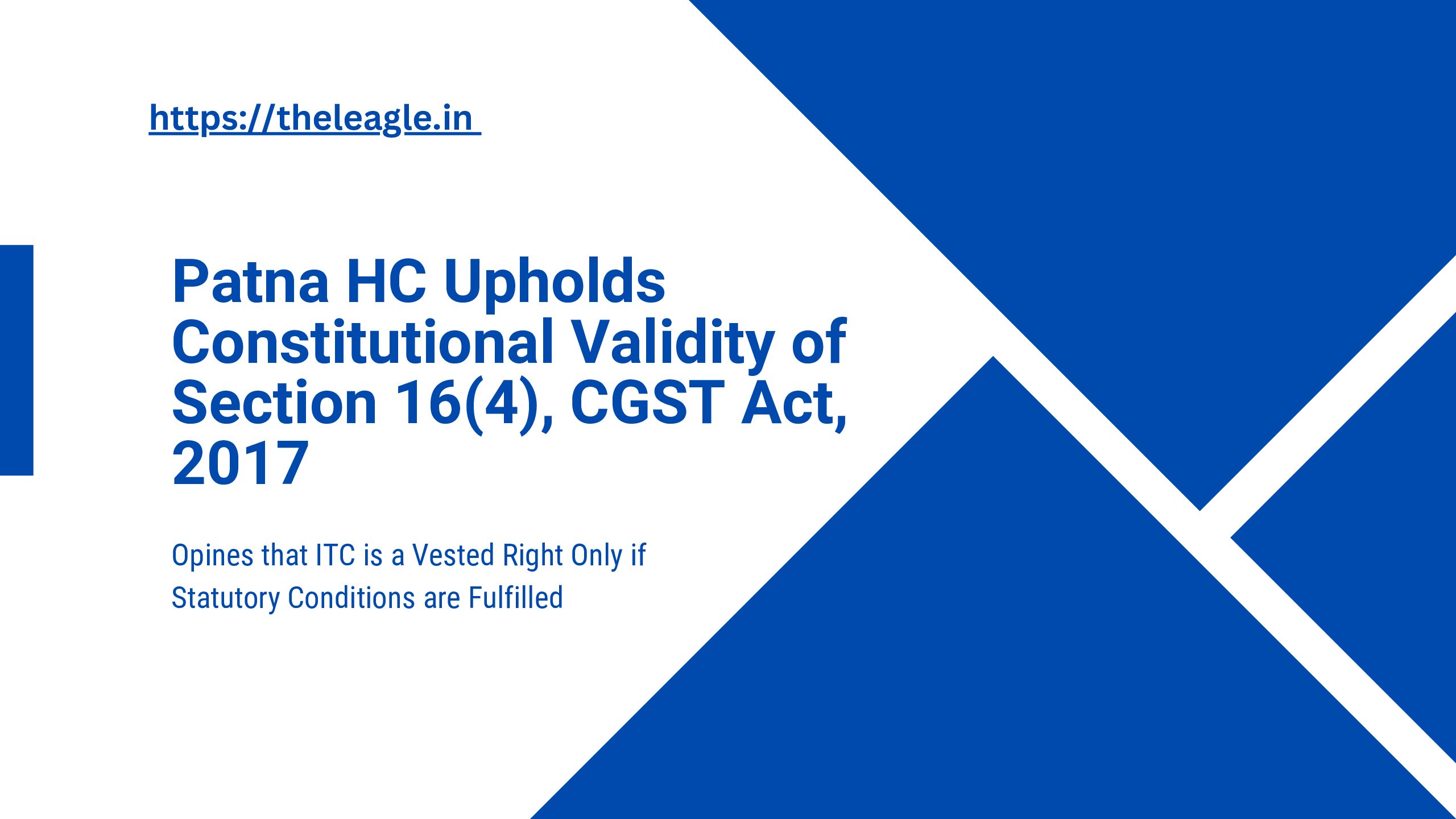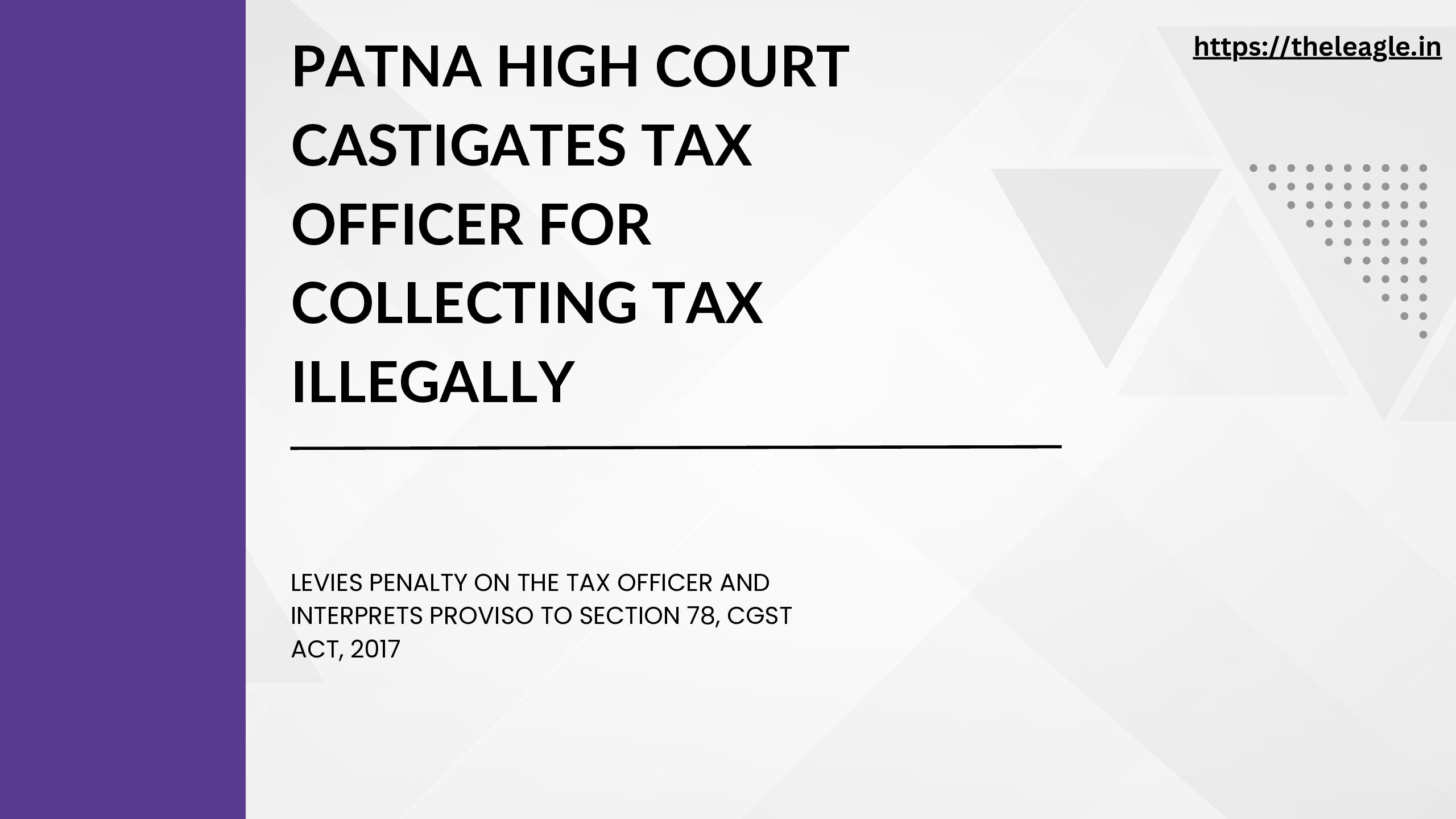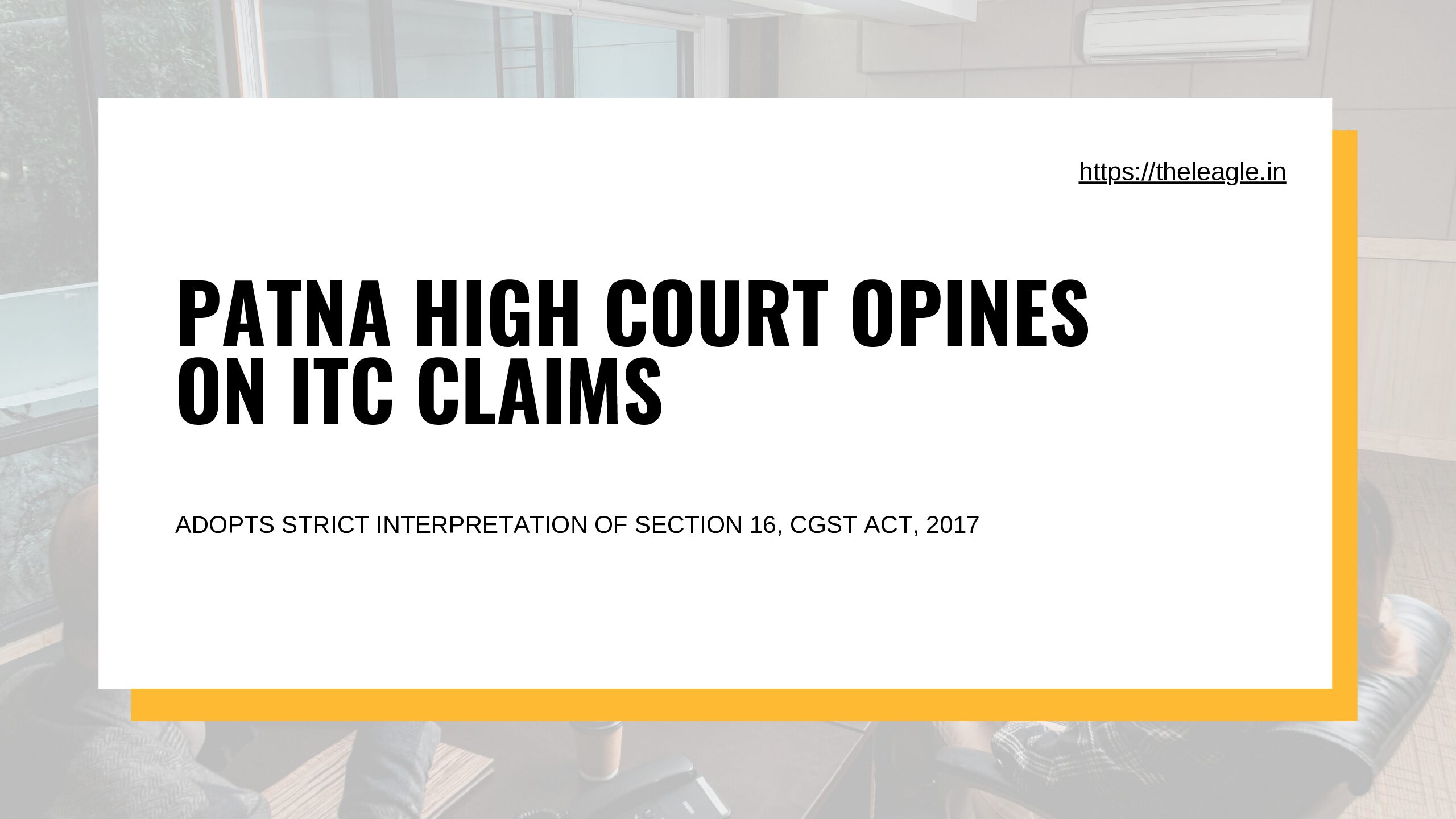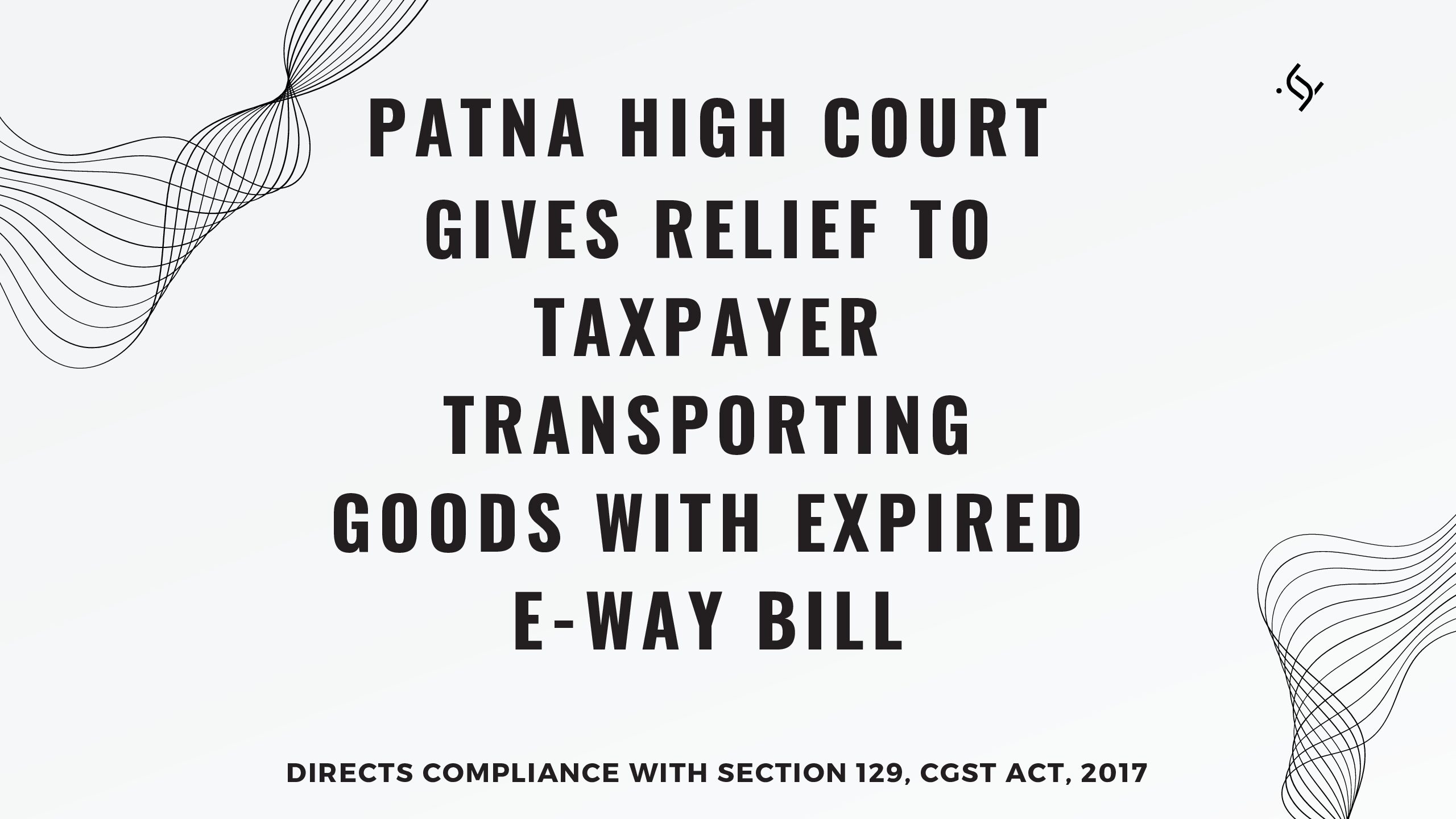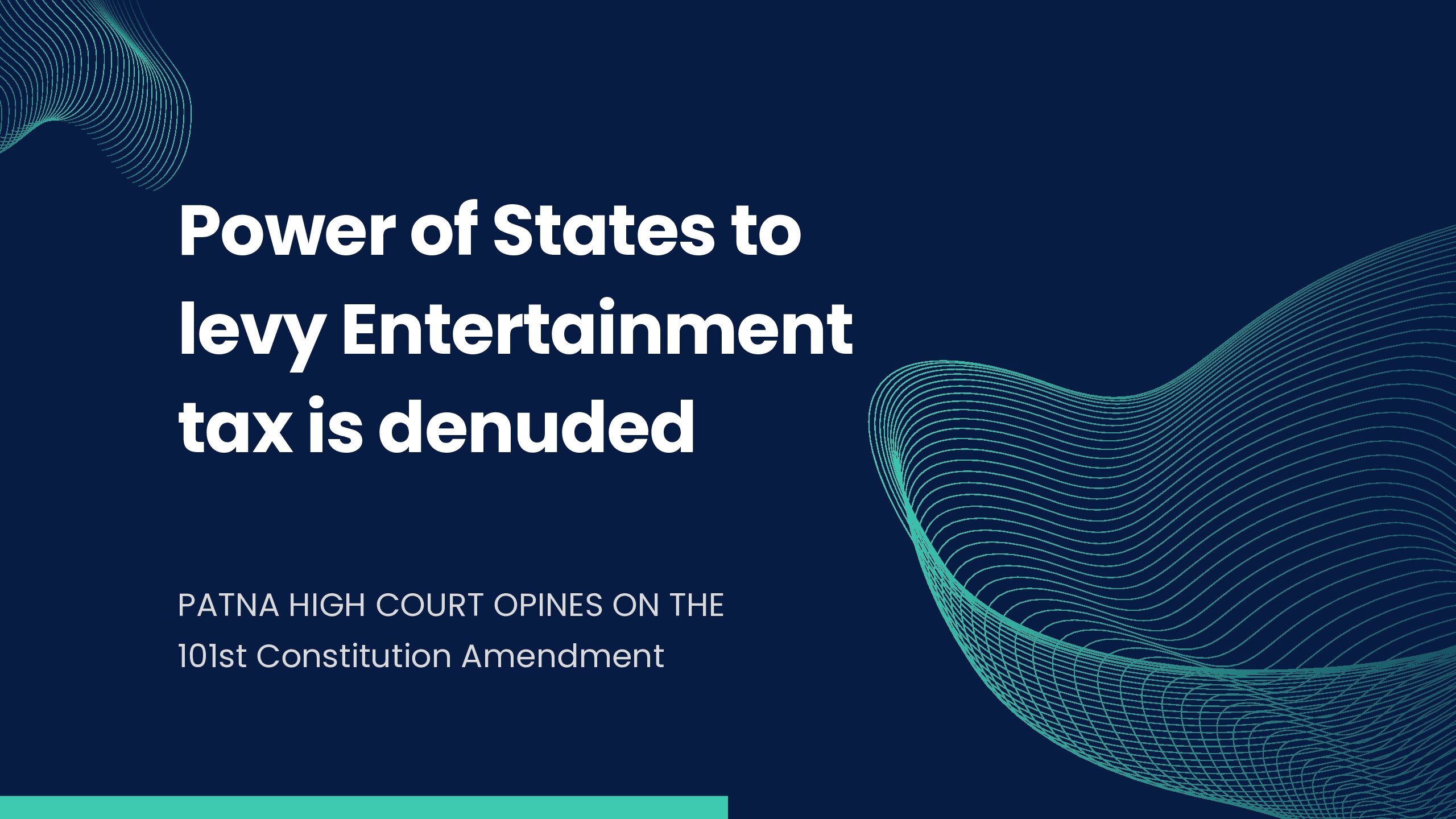In a recent judgment[1], the Patna High Court upheld the constitutionality of Section 16(4), Central Goods and Services Tax Act, 2017 (‘CGST Act’) and Bihar Goods and Services Tax Act, 2017. Section 16(4), as it stood then, did not allow Input Tax Credit (‘ITC’) in respect of any invoice or debit note for supply of goods or services after due date of furnishing returns under Section 39 of the said Acts. The petitioners alleged the said condition under Section 16(4) to be violative of Article 14 and 300A of the Constitution. The High Court made detailed observations about right to property and nature of ITC to reject the claim of petitioners. In this post, I examine the High Court’s reasoning and whether it withstands scrutiny.
Introduction
The petitioners apart from claiming that Section 16(4) violated Article 14 and 300A, also argued that conditions to claim ITC prescribed in Section 16(4) should be understood as procedural in nature as opposed to the ‘substantive’ conditions under Section 16(1) and Section 16(2). And that the former could not override the latter. The petitioners also alternatively argued that Section 16(4) should be read down to apply only to invoices or debit notes received after end of financial year beyond September of the financial year.
The writ petition involved several cases clubbed together since their facts were similar. The facts of representative case were that the assessee was denied ITC for the tax period February and March 2019 because of late filing of GSTR-3B return. The officer in question relied on Section 16(4), CGST Act, 2017 to deny petitioner’s ITC claim. Section 16(4) which prescribes eligibility and conditions for claiming input tax credit, as it stood then, stated that:
A registered person shall not be entitled to take input tax credit in respect of any invoice or debit note for supply of goods or services or both after the due date of furnishing of the return under section 39 for the month of September following the end of financial year to which such invoice or debit note pertains or furnishing of the relevant annual return, whichever is earlier.
Petitioner’s Arguments
The petitioner made several arguments, but in this post, I will concentrate on the interface of ITC as vested right and right to property under Article 300A. Petitioner argued that ITC constituted a vested right under Article 300A since it was tax paid at the time of purchase of goods and services and is adjusted against tax liability payable on sale of goods and services. And that Section 16(4) was confiscatory in nature as denial of ITC is implied in confiscation of property in the shape of financial benefit belonging to the registered person. (para 15) The petitioner also tried to make the claim that ITC was an indefeasible right. By characterizing ITC as a vested right of the taxpayer, the petitioner was trying to persuade the Court that its denial would amount to deprivation of property and thus violate the constitutional right to property under Article 300A.
The State, on the other hand, argued that ITC is not a vested right, but a concession/benefit extended by the State and can only be availed as per the conditions laid down in the statute. It was argued that condition prescribed under Section 16(4) are uniformly applicable to all the taxpayers and there is no question it being discriminatory and violating Article 14 of the Constitution.
The characterization of ITC either as a vested right of the taxpayer or a concession extended by the State is not just a superficial exercise, it would determine the extent and nature of restrictions that the State can impose on taxpayers for claiming ITC and the grounds on which ITC can be denied.
Patna High Court Decides
The arguments of the petitioners and the State mentioned above, clearly reveal that the petitioner’s view ITC as a vested right while the State views it as a benefit/concession. The imprecise nature of ITC is an eternally indeterminate issue under VAT/GST laws. And the judicial oscillation on this issue tends to provide to a wider than necessary leeway to the State in prescribing onerous conditions to avail ITC and consequently also to deny ITC claims. In adjudicating the issue, the Patna High Court in the impugned case framed the issue in interesting terms, it stated that the question before it is: whether ITC per se is a vested right, the denial of which under Section 16(4) would amount to infringement of constitutional right under Article 300-A of the Constitution? (para 18)
The Patna High Court laid emphasis on the phrase ‘deprive of his property’ used in Article 300-A of the Constitution to state that the property in question of the person must be deprived without the sanction of the law for it constitute a violation of the right to property under Article 300-A. Thus, it is important for a successful claim under Article 300-A for the petitioner to prove that they possessed the property in the first place. The High Court first examined the language deployed by Section 16 and concluded that there was no ambiguity in the provision and there was no need to read down the provision, as claimed by petitioners in their alternative arguments. And noting the conditions prescribed under Section 16, for a taxpayer to claim ITC, the High Court concluded that:
we note here that ITC is not unconditional and a registered person becomes entitled to ITC only if the requisite conditions stipulated therein are fulfilled and the restrictions contemplated under sub-section (2) of Section 16 do not apply. One of the conditions to make a registered person entitled to take ITC is prescribed under sub-section (4) of Section 16. The right of a registered person to take ITC under sub-section (1) of Section 16 of the Act becomes a vested right only if the conditions to take it are fulfilled, free of restrictions prescribed under sub-section (2) thereof. (para 26) (emphasis added)
The highlighted part in the above paragraph indicates that the High Court agreed with the petitioner’s argument that ITC is a vested right, but with the added condition that ITC becomes a vested right only if the statutory conditions are fulfilled. Thus, it is possible to deduce from the above that ITC remains a concession/benefit provided by the State prior to the taxpayer fulfilling the statutory conditions, and transforms into a vested right of the taxpayer on fulfilment of the statutory conditions.
Having stated the above, the High Court logically also arrived at the conclusion that Section 16(4) did not violate Article 300-A of the Constitution as ITC was not a taxpayer’s vested right before fulfilment of the conditions under Section 16(4). Thus, question of deprivation of property did not arise prior to fulfilment of those conditions. It also referred to select precedents in a cursory manner to reiterate that Section 16(4) does not violate Article 19(1)(g) and Article 14 of the Constitution. Though the High Court in a latter part of the judgment observed that ‘the concession of ITC’ is dependent on various conditions laid under Section 16 of CGST Act, 2017. (para 36) This, on the face of it, contradicts its opinion of ITC being a vested right; though one can argue that the latter observation was in the context of ITC before fulfilment of the statutory conditions.
Conclusion
The nature of ITC has never been sufficiently scrutinised by Courts to arrive at a determinative finding if it constitutes a concession or a vested right of the taxpayer. Hence, when faced with onerous conditions, taxpayers challenge them on the ground that their vested right is being infringed while the State typically responds by claiming that ITC is a concession; impliedly asserting that it has wide powers to prescribe conditions to avail ITC. Courts have preferred to adjudicate such disputes by limiting their observations to the facts without clearly opining on the nature of ITC. And, to the extent, there are some observations, as in the impugned case, they are rarely built upon by other Courts to build a coherent jurisprudence on the issue. This is a trend that needs to be arrested, else similar disputes on ITC are likely to be decided on an ad hoc basis without creating a conceptually sound jurisprudence under GST.
[1] Gobinda Construction v Union of India 2023 LiveLaw (Pat) 109.
